amandadiamond
95 posts
Latest Posts by amandadiamond












🧛🏼 VAMPIRES + SUNGLASSES 😎 Buffy the Vampire Slayer (1997) Twilight (2008) Only Lovers Left Alive (2013) Bram Stoker's Dracula (1992) Near Dark (1987) The Twilight Saga: New Moon (2009) The Hunger (1983) Wednesday (2022-) Interview with the Vampire (2022-)






my very talented friend emma came over recently and took photos of my home
i think she captured it so perfectly














he kinda 💅




























Cary Elwes + tummy










Cary Elwes through the years aka. Cary Elwes from twink to hunk/dilf (as suggested by @horrorhardcore)










My 10 favorite hot looks of Cary










Cary Elwes + being cute and dorky and adorable








my masterpost | my studygram | ask me anything
[click images for high quality]
[transcript under the cut]
Other advice posts that may be of interest:
All About Procrastination
How To Study When You Really Don’t Want To
Common Study Mistakes
7 Strategies to Improve Concentration
How to Make Your Notes Aesthetic
How to Stop Procrastinating Series
Keep reading
an ultimate guide to crafting your daily schedule 👀✨





‘Ello, mate! It’s werelivingarts and I’m here with a simple guide to manage your time and prioritize your tasks with only 3 steps ~
Before planning anything, For me (you guys might have different approach), I find recognizing my energy level pattern really helpful because I can prioritize tasks and get the done in my most productive time rather than forcing myself to cram for homework after midnight. 🌚🌝
I start planning my day by dumping all of the tasks I remember down to to-do list using Bear, and then I would organize these tasks if they are daily, weekly or monthly task on Edison app – which also allows time blocking. After that, I would prioritize tasks daily on app Success. (This is not ad, this is just helpful apps that I use). 😎
Hope you find this helpful in some ways! Thank you for reading! ❤️💜💙





hey! i made my first graphic!! i hope it helps 🥰
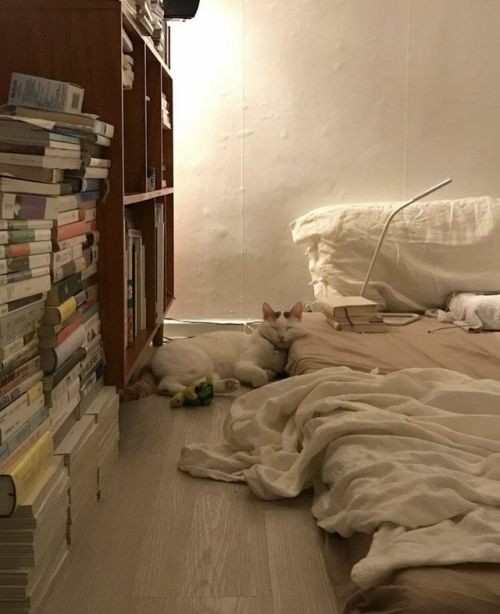





photos under my "dream home" board in pinterest.










How to Study when Stuck at Home
In light of the amount of schools/colleges being shut down globally thanks to the corona virus/covid-19, I thought a little info graphic could be of use to people!
*click for better quality!
Hi dear Lumen,
Do you have any tips on how to study more effectively and/ or memorize better because it would help a lot. Thank you🤍 Have a great day/evening!
Hi darling,
As you may know, I am a maestra at organizing, creating systems, and simplifying things in order to maximize efficiency - and that applies for studying as well. 📚
1. Learn how you learn, in order to learn better!
I often emphasize the importance of self-knowledge and working with instead of against yourself. In this case, that translates as working with your abilities instead of forcing yourself to learn in a dry, outdated, uniform manner that doesn't align with you, just because school, college, or your family says so.
Are you a visual learner (through the eyes)? Then write down your lessons in a concise, aesthetic manner, this will help you memorize easier. Add diagrams, illustrations, or even just sketches related to the lesson, as it further helps with memorizing.
Are you an auditive learner (by listening and speaking)? Then read your lessons out loud. Record yourself if it helps, play it back until you can recite it back. Ask friends to help with rehearsing for extra support.
Are you a haptic learner (by touch and feeling)? - This one's more tricky, but you can employ some activity while studying, such as braiding, tapping your fingers or feet, gesturing, etc.
There are theories of other types of learning, as mentioned here and here. If the above 3 don't apply to you, do a quick research to see what resonates with you more, in order to find a more efficient technique. It can make all the difference in your study routine.
2. Figure out a routine that works for you.
Do you study better in the evening/at night? When it’s quiet and nobody is disturbing you and your schedule is clear? You may be a night owl and it’s your natural circadian rhythm to have higher brain activity and energy towards the evening/night - if so, take advantage of it.
Do you study better in the morning? Because you feel fresh and focused? You’re likely an early bird, so arrange your study schedule to follow this rhythm accordingly, you'll be much more productive.
If you have a chaotic schedule that doesn't allow much flexibility for the above, simply work with your available schedule to the best of your ability. Move household chores and other errands around so that your peak efficiency timeframe can be used for the bulk of your studying.
3. Additional tips:
Do rewards help in completing a task? If yes, try something useful like taking a sip of water after reading 3 paragraphs, or that you can watch your favorite show after finishing studying, or going to the museum, or whatever it is that makes you excited at the moment!
Do you have a short attention span? Don’t worry about it, just divide your studying in brief intervals of 30-60 min, with a small break inbetween to keep your concentration sharp. If you start to get distracted, remember why you’re doing this (your academic goals, whatever they are), and if that doesn’t work, maybe you just need some fresh air or a cup of tea to start fresh.
If you have issues staying on track, you can ask a friend or family member to hold you accountable by checking up on you.
Don’t forget to make studying enjoyable as possible: use colorful stationary, set up a nice desk that fills you with pleasure or excitement when you see it (ie. plants, lighting, pretty decor, books organized in a satisfying way, etc), a fluffy pillow against your back, the list goes on. Get creative! This is your space.
Another way to make studying enjoyable is thinking out of the box. If you prefer a more streamlined, digital system, use an app that makes the process of studying more enjoyable - whether it’s something as basic as the native Notes app on macOS, Word docs, or a professional tool like Ulysses where you can organize everything to your heart’s content.
Visual inspiration and moodboards: you can also browse through Pinterest boards for inspiration or even follow Tumblr studyblr-ers to make studying as a process more aesthetic and appealing. There is a truth that the imagery we expose ourselves to inspires our actions; when you have your dashboard filled with pretty desks and notebooks and tidy handwriting from bookblr and studyblr content, it can boost your motivation. (Just be mindful not to fall into the trap of unhealthy perfectionism, or associating your self-worth with productivity - neither of those things will help you in any way, and will only cause anxiety, low productivity and self-worth issues.)
If you fall off track, don't be hard on yourself. It happens to the best of us. If you really want to finish what you started, just do what you can, take it one step at a time, and remember that you only fail if you stop trying. Give yourself space to do your best (even if that is 5% on some days, it's still good enough), and improve along the way. You can do this! 👏🏻👏🏽👏🏿
Hope this helps. Good luck and have a productive day/evening ahead to all ambitious ladies! 💞 ☕️
-Lumen
Study in a brain-friendly way: Making a week plan
Write down all study appointments. For example: Lectures, work groups, seminars, deadlines for essays and exams.
Write down the already planned and important social appointments. For example: Working hours for a (voluntary) job, sports, important parties, dinner appointments.
Write down necessary time to relax. We recommend keeping at least one day free of study of study tasks, for example in the weekend. Also, take into consideration: Mornings after a late-night activity, and evenings after a long day of work.
Write down self-study time. When will you be able to study? Study appointments + self-study should comprise about a full-time job (40 hours per week). What will you do during this study time? When will you have breaks?
Now write down some buffer time. Life is full of surpries. In all lives unexpected events will occur. So, it’s absolutely necessary to plan in buffer time. In the time you plan in ‘in reserve’ you can complete tasks that have been delayed. If there is no (study) delay, buffer times becomes free time.
Think about the time-slots that are still empty. Are there specific things you would like to do in this time? If not, name them: ‘free time’. Especially if you’re a perfectionistic person, it’s good to also make your ‘free time’ SMART so you know when you are NOT going to worry about your studies.
self discipline tips
here are tips I discovered very recently:
something is better than nothing. 5 minutes of work are better than zero. Just because you missed something on your schedule doesn’t mean you can’t still work on it, even for 5 minutes. Grow and build on this.
second drafts / reviews can be done after.
Don’t think you are going to do your very best work on the first try. Take the weight of perfectionism off your shoulders.
don’t think about doing it. just do it as fast as you can.
build on your productivity, not your failures.
If you come from a past of procrastinating and now feel motivated to change and discipline yourself, do NOT try to do everything at once.
if you have a set of different goals to accomplish, begin with the most important one. Wait until the rotine of working for that one settles in (you feel productive and comfortable-ish), and then begin with the next. Repeat.
this way you’ll be building your way up and not juggling everything at the same time, hoping everything works out.
be patient with yourself, you’ll get there!
set smaller deadlines for your goals
have monthly and weekly-ish deadlines
e.g. if you are doing a project, due 22nd Feb, set personal deadlines, like have Introduction written by 2nd Feb, have Methods written by 10th Feb, have project complete by 18th Feb.
take them as seriously as you possibly can, don’t miss out on yourself.
write realistic daily tasks and don’t stop until you finish them. after them you can do whatever you want
on writing realistic daily tasks, the secret is knowing you can only do so much in one day, but trusting you can accomplish everything in the course of any period of time (a week, or 2 weeks or a month, etc.) because you will combine the work from all these different days.
it’s very tempting to write down all the tasks you need to accomplish in one day to just get over with it, but the real deal is you won’t accomplish half of them. You’ll feel very unproductive then, wich leads to demotivation.
spread daily tasks in the time necessary.
have a consistent sleep schedule.
if your mind isn’t ready everything will fall apart.
have one rest day per week where you plan nothing, do whatever you want except studying. this can be harder than you expect!
(don’t forget these are effective only if you actually put them into practice! good luck babes!!)





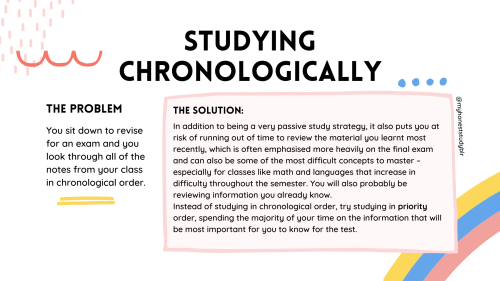




my masterpost | my studygram | ask me anything
[click images for high quality]
[transcript under the cut]
Other advice posts that may be of interest:
How To Study When You Really Don’t Want To
Active Revision Techniques
How To Do Uni Readings
How to Revise BIG Subjects
Keep reading
eleven little self care tips for students
Get enough sleep. Your brain needs it. Set yourself a ‘bed time’ and fall into the routine of going to bed and waking up at the same times each day.
Drink water and lots of it. Aim for 2 litres a day. This one’s easy, you can do it. Ditch the juices and carbonated beverages, just add a slice of lemon to your water if you feel like something fancy.
Allow yourself to switch off. Don’t be afraid to read books that have nothing to do with your studies. Go to the cinema. Work out. Take your mind away from your workload.
Take care of your skin. Wash your face every morning and night. Moisturise after every shower and bath. Don’t go to bed with your make-up on, no matter how tired you are.
Talk to your friends and family about something other than school. Don’t let your studies detach you from the things going on around you.
Work out. Even just once a week, or whenever you can. Go for a walk or a run, maybe just for 15 minutes. Follow along with a YouTube exercise video from the comfort of your own home or try out some yoga moves.
Make time for your hobbies. Studying is your full time job, but there’s plenty of hours left in the day. Don’t neglect the things you love.
Cook. Sometimes all we have time for is microwave noodles, but don’t fall into the habit of relying on the basics. You’ll feel the difference.
Don’t forget to laugh. Watch a hilarious film. See a comedian at a local venue. Watch funny videos on YouTube. Reminisce with friends. It’ll do you good.
Ditch the caffeine. Don’t rely on Starbucks. It’s delicious but you don’t need it. Save up all the money you’d usually spend on coffee and treat yourself to something instead.
Make your bed every morning. You’ll be grateful at the end of a long day when you can get into a cosy bed that doesn’t look like you just rolled out of it.






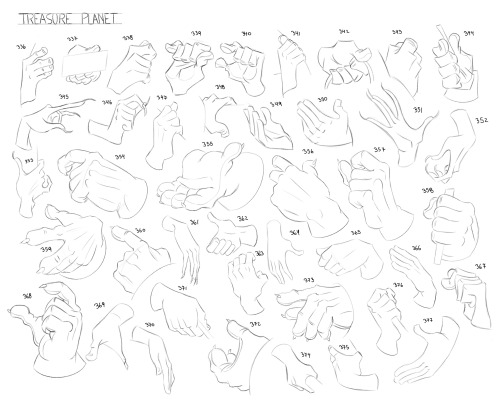
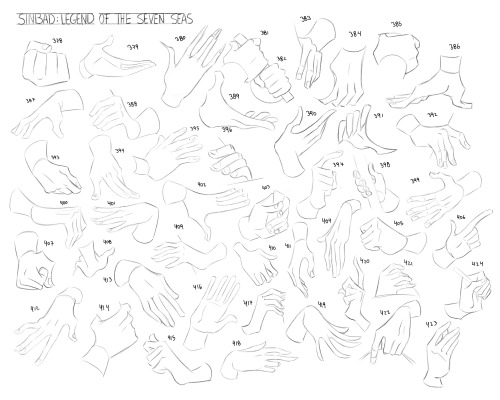

500 hands in 5 days 💀 ! feel free to use them for reference ❤️
> 500hands challenge
How to learn a language when you don’t know where to start:
General Plan:
Weeks 1 and 2: Purpose:
Learn the fundamentals sentence construction
Learn how to spell and count
Start building a phrase stockpile with basic greetings
The Alphabet
Numbers 1 - 100
Subject Pronouns
Common Greetings
Conjugate the Two Most Important Verbs: to be and to have
Basic Definite and Indefinite Articles
Weeks 3 and 4: Purpose:
Learn essential vocabulary for the day-to-day
Start conjugating regular verbs
Days of the Week and Months of the Year
How to tell the time
How to talk about the weather
Family Vocabulary
Present Tense Conjugations Verbs
Weeks 5 and 6: Purpose:
Warm up with the last of the day-to-day vocabulary
Add more complex types of sentences to your grammar
Colours
House vocabulary
How to ask questions
Present Tense Conjugations Verbs
Forming negatives
Weeks 7 and 8: Purpose:
Learn how to navigate basic situations in a region of your target language country
Finish memorising regular conjugation rules
Food Vocabulary and Ordering at Restaurants
Money and Shopping Phrases
Present Tense Conjugations Verbs
Weeks 9 and 10: Purpose:
Start constructing descriptive and more complex sentences
Adjectives
Reflective verbs
Places vocabulary
Weeks 11 and 12: Purpose:
Add more complex descriptions to your sentences with adverbs
Wrap up vocabulary essentials
Adverbs
Parts of the body and medical vocabulary
Tips for Learning a Foreign Language:
Learning Vocabulary:
What vocabulary should I be learning?
There are hundreds of thousands of words in every language, and the large majority of them won’t be immediately relevant to you when you’re starting out.Typically, the most frequent 3000 words make up 90% of the language that a native speaker uses on any given day. Instead try to learn the most useful words in a language, and then expand outwards from there according to your needs and interests.
Choose the words you want/need to learn.
Relate them to what you already know.
Review them until they’ve reached your long-term memory.
Record them so learning is never lost.
Use them in meaningful human conversation and communication.
How should I record the vocabulary?
Learners need to see and/or hear a new word of phrase 6 to 17 times before they really know a piece of vocabulary.
Keep a careful record of new vocabulary.
Record the vocabulary in a way that is helpful to you and will ensure that you will practice the vocabulary, e.g. flashcards.
Vocabulary should be organised so that words are easier to find, e.g. alphabetically or according to topic.
Ideally when noting vocabulary you should write down not only the meaning, but the grammatical class, and example in a sentence, and where needed information about structure.
How should I practice using the vocabulary?
Look, Say, Cover, Write and Check - Use this method for learning and remembering vocabulary. This method is really good for learning spellings.
Make flashcards. Write the vocabulary on the front with the definition and examples on the back.
Draw mind maps or make visual representations of the new vocabulary groups.
Stick labels or post it notes on corresponding objects, e.g when learning kitchen vocabulary you could label items in your house.
How often should I be practising vocabulary?
A valuable technique is ‘the principle of expanding rehearsal’. This means reviewing vocabulary shortly after first learning them then at increasingly longer intervals.
Ideally, words should be reviewed:
5-10 minutes later
24 hours later
One week later
1-2 months later
6 months later
Knowing a vocabulary item well enough to use it productively means knowing:
Its written and spoken forms (spelling and pronunciation).
Its grammatical category and other grammatical information
Related words and word families, e.g. adjective, adverb, verb, noun.
Common collocations (Words that often come before or after it).
Receptive Skills: Listening and Reading
Reading is probably one of the most effective ways of building vocabulary knowledge.
Listening is also important because it occupies a big chunk of the time we spend communicating.
Tips for reading in a foreign language:
Start basic and small. Children’s books are great practice for beginners. Don’t try to dive into a novel or newspaper too early, since it can be discouraging and time consuming if you have to look up every other word.
Read things you’ve already read in your native language. The fact that you at least know the gist of the story will help you to pick up context clues, learn new vocabulary and grammatical constructions.
Read books with their accompanying audio books. Reading a book while listening to the accompanying audio will improve your “ear training”. It will also help you to learn the pronunciation of words.
Tips for listening in a foreign language:
Watch films in your target language.
Read a book while also listening along to the audio book version.
Listen to the radio in your target language.
Watch videos online in your target language.
Activities to do to show that you’ve understood what you’ve been listening to:
Try drawing a picture of what was said.
Ask yourself some questions about it and try to answer them.
Provide a summary of what was said.
Suggest what might come next in the “story.”
Translate what was said into another language.
“Talk back” to the speaker to engage in imaginary conversation.
Productive Skills: Speaking and Writing
Tips for speaking in a foreign language:
If you can, try to speak the language every day either out loud to yourself or chat to another native speaker whether it is a colleague, a friend, a tutor or a language exchange partner.
Write a list of topics and think about what you could say about each one. First you could write out your thoughts and then read them out loud. Look up the words you don’t know. You could also come up with questions at the end to ask someone else.
A really good way to improve your own speaking is to listen to how native speakers talk and imitate their accent, their rhythm of speech and tone of voice. Watch how their lips move and pay attention to the stressed sounds. You could watch interviews on YouTube or online news websites and pause every so often to copy what you have just heard. You could even sing along to songs sung in the target language.
Walk around the house and describe what you say. Say what you like or dislike about the room or the furniture or the decor. Talk about what you want to change.This gets you to practise every day vocabulary.
Tips for writing in a foreign language:
Practice writing in your target language. Keep it simple to start with. Beginner vocabulary and grammar concepts are generally very descriptive and concrete.
Practice writing by hand. Here are some things you can write out by hand:
Diary entries
Shopping lists
Reminders
What could I write about?
Write about your day, an interesting event, how you’re feeling, or what you’re thinking.
Make up a conversation between two people.
Write a letter to a friend, yourself, or a celebrity. You don’t need to send it; just writing it will be helpful.
Translate a text you’ve written in your native language into your foreign language.
Write a review or a book you’ve recently read or a film you’ve recently watched.
Write Facebook statuses, Tweets or Tumblr posts (whether you post them or not will be up to you).
Write a short story or poem.
Writing is one of the hardest things to do well as a non-native speaker of a language, because there’s no room to hide.
There are lots of ways to improve your writing ability, but they can be essentially boiled down to three key components:
Read a lot
Write a lot
Get your writing corrected

Bwahahaa, it’s my favorite time of year! I’ve been watching a bunch of old horror and sci-fi classics, so here you are… The Bride! <3
Hope you all are having a good Halloween season so far :)
If you’d like, feel free to check out my society6 shop!
society6.com/audreybenjaminsen
There’s plenty of goodies that will fulfill your Halloween needs- and I would appreciate the support greatly! (Plus free shipping today!)
<3
Audrey Benjaminsen 2015

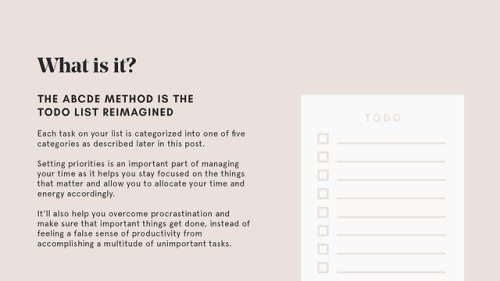





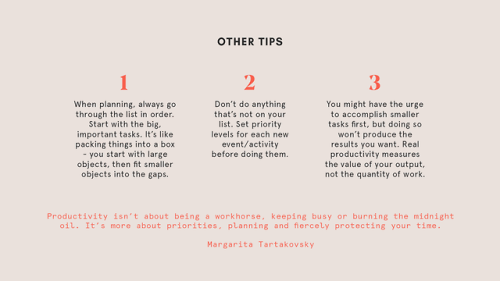
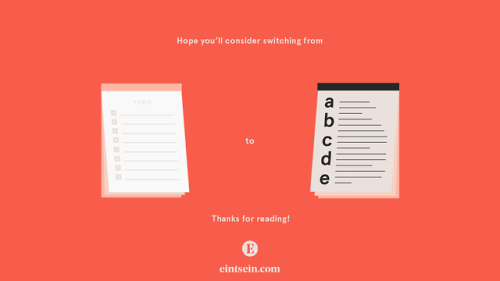
The ABCDE Method: Accomplish Tasks more Efficiently
I recently came across the ABCDE method that’s similar to what I do to stay productive each day: instead of lumping up all your tasks, sort them into categories and tackle each of them differently. Here’s an outline of the method. Hope it helps :)
“The fear of getting hurt again has only led you to hurt yourself. Come out now. Come out while there’s still some living left to be done. This person who hurt you doesn’t deserve to still dictate your life decisions. Your discipline and dedication to structure is an illusion. You’re still powerless because you’re letting certain incidents define your life. If you really want to be in control again, you have to learn to let go again. It’s the only way.”
— Ryan O'Connell

hello pals!! this is a masterpost of half (or so) of the reference posts i reblogged/made. i tried uploading this masterpost as just one big masterpost but i had over 250 links so that failed and here i am again. here is part one, encapsulating studying + certain subjects which will be followed by part two (slightly more general) here! enjoy ✨
studying, school, + learning
what i’ve learnt throughout my years of being a student
notes, studying, and self-study resources
self-study resources
starting a studyblr
college + uni
how to get studying
online study guides
good habits
exams!
study management
school is starting soon
back to school (1)
back to school (2)
back to school (3)
back to school reminders
50 things to know for back to school
get prepared for a new school year
school resources
final grade calculator
writing emails to professors
cheap textbooks etc!!
save money on textbooks
school
first week of school stuff
testing effect
make studying fun
high school tips
101 study tips
types of learners
lazy kid’s guide to good grades
catching up on missed work
university tag
igcse resources
sat tag
act tag
ap tag
ib tag
a-level revision tips
diy school supplies
test taking tips
a complete guide to studying (well)
time to study!
groupwork (1)
groupwork (2)
tips tag
study effectively from textbooks
studying better
surviving your least favourite class
studying a subject you hate
success
doing research
understanding the question
pomodoro
study tips
tactile learning
how to concentrate
concentration
exam day
ultimate study masterpost
study tips for exams
school survival
studying on the go
how to read academic journal articles
how to study smart
how to remember anything in 3 steps
distraction-free studying
motivation
my study instagram + study blog
+ motivation links
motivation masterpost
stay motivated
get that homework done!
reaching goals
getting motivated
motivation through anime
writing
writing tag
recover an unsaved draft
uni writing resources
add citations!
annotating (1)
annotating (2)
advice for writing papers
writing helps
essay writing tips
how to write an essay
writing term research papers
active vs passive voice
writing masterpost
academic writing resources
essay checklist
reduce your word count
essay writing links
how to write and execute a huge piece of work
summary writing
the discursive/argumentative essay
the narrative essay + the descriptive essay
note-taking
note-taking in class
cornell note-taking
cornell (2)
lecture notes
illustrating notes
banners
maintaining good notes
note-taking
sticky notes
flashcards
colour-code + highlight effectively
colour-coding
studying from textbooks
study guides
upgrade your notes
illustrate your notes
mind maps
note-taking for different lecture types
ribbon drawing
smart highlighting
lettering ideas
how i take notes
note-taking tips
aesthetically pleasing notes
fake cursive notes
languages + literature
the ultimate english masterpost
shakespeare
literature masterpost
annotating
studying a foreign language
100+ legal sites to download literature
approaching poetry analysis
write a killer unprepared text essay
literary analysis research papers
classics
how to ace lit
reading lit
write a rhetorical analysis essay
practice oral comprehension!!
how i study for english lit
poetry analysis (1)
poetry analysis (2)
how i learn languages
self-studying languages
languages tag
how to open a new book
literary devices
literaty devices w/ printables
literature masterpost
grow your vocab
a guide to vocab
language learning tips + resources
SUPER IMPORTANT FOR POLYGLOTS
tips + tricks for learning a language
chinese
english
french
german
greek
italian
japanese
korean
latin
maltese
polish
russian
spanish
swedish
humanities + other subjects
studying humanities subjects
gathering materials for a humanities research paper
philosophy
philosophy tag
psychology tag
politics + government
women of wwi
ap world history
coding
design resources
sciences + math
how to memorise diagrams
biology (1)
biology (2)
studying biology
biology help
biology note-taking
anatomy + physiology
physiology
physics
ap physics
chemistry (1)
chemistry (2)
chemistry note-taking
studying chemistry
maths tag
how to study for math
how to study math (1)
how to study math (2)
math (1)
math (2)
math (3)
10 tips to excel in maths
avoid carelessness in calculations
succeed in math without really trying
math resources and links
algebra (1)
algebra (2)
precalculus
geometry
space + astronomy (1)
space + astronomy (2)
hope this helps + please check out part 2 as well!! ilysm 💗
ps here is a list of all my masterposts just in case 🐝
- helena xx

since my last masterpost on mind maps was successful i thought i’d make a masterpost about general studying! this way i get to share with you guys what i’ve found out over the years with my personal experience!
your study space
the space you choose to study is really important! it can be in your bedroom, another place in ur house, library, cafe, a park, etc
it should be somewhere u can focus + concentrate without distractions
have more than one place to pick from in case u ever need to change a little or can’t use one
lighting is really important. good natural lighting is always best; try to find a place where the light comes from your left if you’re a righty or from the right if you’re a lefty – you’ll thank me when ur writing and u can see everything perfectly
if ur in ur room, figure out whether having motivational quotes/pics on your walls help u or distract u – for me, i like to have a couple but not many, and mostly motivational quotes + sticky notes with the stuff i need to get done
keep it organised! u can use drawers to keep ur suplies so that they aren’t all laying around when ur studying if u don’t need them
lay out everything u need when ur about to start studying so that u don’t have to get up to get this or that all the time
study methods
it’s great to try out many different ones!
you’ll always have a couple u prefer but don’t be afraid to experiment
masterpost by @heystudy
masterpost by @etudiance
flashcards are awesome for memorizing + testing yourself! here are some tips for making them by @tbhstudying
here’s a great alternative for flashcards by @studyign!
mind maps are great for linking information + understanding + condensing. here’s a link to my masterpost!
rewriting notes is an awesome way to revise!
when u rewrite ur notes, u can color code them + add lil drawings + diagrams, make them more visual overall
great masterpost on visual/aesthetically pleasing notes by @areistotle
if they’re available, always try to find old exams and take them to practice! u can take them under exam conditions or not, whatever helps u the most
background music
first of all, u need to figure out whether u work better with or without background music, because it may end up distacting u
if u don’t want music but still need background noise, u can listen to white noise or ambient noise!
classical music is awesome; studies have shown that it benefits the brain, sleep patterns + stress levels
u can listen from playlists on 8tracks, spotify or youtube vids [i prefer 8tracks]
check out my #music tag for great playlists + masterposts!!
pomodoro method
you’ve probably heard of it all over the studyblr community and that’s because it’s awesome
here’s a link to the official site!
it’s great for helping u focus; i work better like this because i couldn’t study for an hour straight if my life depended on it, + i still get everything done!
however, don’t adapt yourself to the times it sets for u but the other way around – if you’re working and the 25 minutes are done but u still feel like u can continue, you’re motivated and focused, go on!
don’t know what to do in those breaks? here’s the list for u!
i use forest to time myself! it’s great cause it also keeps u from checking ur phone. focusnow is a free alternative for ios
general tips
start revising early, even if u know u can cram and get good results. i used to do the last thing and even though i got really good grades i was always super stressed the day before and it made studying suck even more
avoid checking social media while studying, even tumblr for “motivation”, because you’ll inevitably get sucked into it
form a study group or find a study buddy because they’ll help u focus, u can explain to each other when u don’t understand something, etc
know everything u need to get done and prioritize
make ur notes pretty only if u have the time + it helps u
if u don’t have the time to make ur notes pretty but are a visual learner, grab a highlighter and colour code them – e.g. green for terms, yellow for definitions, pink for dates/people
figure out whether u work best in the morning, afternoon or evening. try not to study at night unless necessary + get good rest bc it helps ur brain work better
+ masterposts
studyblr-ing 101
apps for ur life
how to mind map
i hope you found this masterpost helpful!! if u have any questions or request for a masterpost, send me a message!
sofi xx
the no bullshit guide to getting your shit together: for the lazy student
Let’s be honest: time management and organization? They’re really hard. Sure, at first you might feel like you’ve gotten the hang of them, that you’re in control of your life. But how often have you fallen off the wagon? Procrastinated on one thing and the next moment, you’re behind in all your classes? I know that sometimes laziness feels like a part of who you are, but honestly, fuck that. Do you really want to give up your success for the disinterest of a moment?
If your answer is no (it better be no, or you really need to get your priorities straight), let’s get to it.
STEP ONE: BE HONEST WITH YOURSELF
“This class doesn’t even matter.” “I don’t care about my grades.” “I can finish this the day before.” Sound familiar? You might feel great now, but when you’re staring down at your report card later, it’ll feel like you just got punched.
This is a cliche, but the greatest obstacle to your success is yourself - especially the lies you tell yourself! Sit yourself down and be honest about what you need to improve on. Be as blunt as you can, but for god’s sake, don’t throw yourself a pity party! There’s no use agonizing over what you can’t change. Instead, set realistic, achievable goals, and make a game plan. Struggling with math? Go to extra help. Behind in all your classes? Stay in for a couple nights and actually work.
STEP TWO: STOP WITH THE FANCY SHIT
Now you know what your goals are, but maybe you want some inspiration, so you log on to tumblr and are instantly bombarded by all these beautiful, well lit shots of the most gorgeous bullet journals, planners, and notes. Impressive, right? Well, I’m gonna let you in on a little secret: they’re all useless! A simple phone planner works just as well, if not better, than a fancy agenda, because you’ll always have it on you, it’s not a hassle to carry around, and you don’t feel obligated to make it look pretty.
Riddle me this, where are you going to find all this extra motivation to keep prettying up your bullet journal? To write all your notes in perfect, colour coded printing? There aren’t many times in life where taking the easy was out will actually benefit you, so take advantage! Stop wasting your time; get a phone planner and write your notes in your natural goddamn handwriting.
STEP THREE: CLEAN YOUR ROOM
Yep, your entire room - not just your study space! This one can be put on the back burner for a bit if you’re on a really pressing deadline, but I wouldn’t recommend it. I’m notoriously messy, and if I don’t watch myself, I’d find myself in dirty-laundry-and-old-notes hell. A little bit of organized chaos is fine, I even encourage it! But try working when your desk is covered in mounds of paper and you have nowhere to put your laptop – it’s just not conducive to success.
Keeping your entire room clean is a way to stave off stress, frustration, and even embarrassment, because nobody wants to show potential roommates how much of a mess they are.
STEP FOUR: ACTUALLY WORK
Yeah, I know what you’re thinking: “actually work? Who does this girl think she is?” I’d probably think the same thing, except I’ve learned the valuable lesson of sucking it the hell up, and you will too. When you get home from work, grab a snack and work. When you have a free period, figure out what’s due and work. Stop reasoning yourself out of work: you’re not going to finish this later, and that will be on the test. There’s really not much to say about this one, because it’s the step that requires the most raw effort, and you’re really only going to find that within yourself. Tell yourself what’s at stake, and realize that, by setting the standard for your mediocrity now, you’re potentially trapping yourself in a cycle that will last for years.
STEP FIVE: CUT YOURSELF SOME SLACK
Maybe you’ve been on top of your shit for a day, a week, or even a month, and that’s really great. But then… you fail. You miss a deadline or you bomb a test. So what do you do now? Do you allow yourself to fall back into your old habits? Fuck no! Everyone fails, even that studyblr with those perfect bullet journal photos and a perpetually clean study space. I’m going to tell you something that’ll sound really strange: you should value your failures, especially if you worked hard to avoid them. What?! Be HAPPY about failing when I actually TRIED? Yeah, you heard me right. If you don’t know how to handle failure, then when you inevitably experience it, your reaction will be much worse.
Failing hurts, and boy, I know how embarrassing it can be. But learning how to deal with failure, and especially how to keep trying after it happens, is an invaluable lesson.
STEP SIX: TREAT. YO. SELF.
Disclaimer: I’m not suggesting you treat yourself after the most basic of tasks, because please. Treat yourself when you know you goddamn well deserve it. Remember that “all work and no play makes jack a dull boy.” If all you do is study and do your homework, then, pardon my french, your life sucks. If you don’t have friends, play a video game! Eat an entire jumbo chocolate bar! Indulge in whatever the fuck you want, you deserve it. I’m someone that has trouble prioritizing future benefits over immediate gratification, so by allowing myself little pleasures, I save myself from crashing and burning.
Hope these tips helped, but remember to take them with a grain of salt - you’re you and I’m me, and different things work for different people. Good luck!
How I Changed My Feelings About Mornings
Or, a less anxiety-inducing Morning Routine guide from the worst morning person in the world.
If you’re anything like me, mornings are pretty much the worst part of your school day. In fact, mornings used to be the most anxious part of my day. I’d stay in bed past my alarm, rush to get ready, eat “breakfast” in 5 mins, and drive to school with what I call, “Morning Traffic Anxiety” (you know the feeling). But a few years ago, I came to the conclusion that although my anxiety would never truly go away, I did have the power to make my mornings feel a little more like “me time”. Here are my tips on how to start off your day in the best way possible.
I don’t care how confident you think you are; You need alarms. That’s right- alarmS- plural. This isn’t just to wake you the hell up; I’ve learned that setting several alarms is the best way for you to keep track of how much time you’ve spent doing something. And, if you’re anything like me and know you like to stay in bed past your alarm, set your first alarm even earlier. For example, my first alarm for “waking up” is 5:30, the alarm for actually physically getting up from bed is 6:00, out of the bathroom by 6:30, downstairs by 6:45… you get the picture. Not only are alarms for waking up, but they’re also for timing yourself. My alarms are set in 15-30 min. increments away from each other, but do whatever floats your boat.
Commit to your sleeping/waking up schedule. I love sleeping-in on weekends as much as the next girl; but please don’t torture yourself by over-sleeping. You’ll just regret it by the time it’s monday morning. Stay (somewhat) consistent and your body will thank you for it.
Listen to music while you get ready. This is one of the best and mose effective tips I’ve ever come up for myself, self-care wise. If I’m feeling particularly anxious, I’ll put on a peaceful, calming playlist to get ready to. If I want to wake up more energetic and am getting ready for a busier day, I’ll play more fun and upbeat songs. Whatever music you choose, I promise it’ll change your mood. (If you need some morning music recs, you can find my playlists here!)
Plan out your Tomorrow Outfit. I know, I sound like your mom. But trust me, it really does help and it saves you so much time! If you don’t want to physically put out your outfits, at least have an idea in your head for the next morning.
Please. For the love of God. Eat breakfast. Even just a little bit. I never understood how some of my friends and classmates could, dare I say, SKIP breakfast and survive class. This concept leaves me in awe. I personally feel like I’m going to collapse if I don’t eat breakfast. Please eat; even if it’s just a little bit! Find the time to actually make a good breakfast, or even pre-make a good breakfast the night before. Bagels, toast, and oatmeal are great quick and wholesome-enough breakfast choices. Also, remember that your morning is YOU time- take this time to enjoy your favorite coffee/tea without rushing! It feels good, trust me.
As you can see, a lot of working on bettering your mornings is about time. Speaking from experience, I can confidently say that rushing is not fun. I hate being late, and being in a hurry just makes my anxious mornings even worse. The best tip I could ever give is to find a morning routine that works for you, practice it, and stick with it. Just like any other struggle, making your mornings more enjoyable just takes commitment; but it’s 100% do-able!
how to *actually* prepare for back to school
ok so i go back to school v soon (august 7th to be exact) and here are some of my tips that i use to help prepare myself for going back to school.
start your routine. now. at least a week before your first day of school, get into your routine. get up when you’re supposed to and go to bed when you should (11 for me at the latest). as for the “school day,” busy yourself with reading, playing video games, working, the like. but try to get home when you would from school and kinda pretend like you’re back in school and “do homework” or workout or whatever you would do when you get home. starting that routine now will make it soooo much easier when the school year actually starts
figure out how much sleep you need to function and fix your sleep schedule. do i have to explain this one??? just don’t stay up until 2am the night before you’re first day of school because you’ll be screwed for the rest of the year :)
get your supplies. ok this one is a given. whether you’re paperless or not, get at least a folder to keep stray papers. i would also recommend having a separate folder just for lined paper bc you never know when you need it and idk about you but i hate ripping papers out of notebooks
get new clothes. you don’t necessarily ~have~ to do this one but it’s nice to have a semi-new wardrobe before you head back to school. when i wear something new, i feel more confident and i’m more excited for the day so it kinda makes me excited to go to school.
pick out your outfits for the first week. this relates to getting new clothes. i like doing this (every week) because it’s one less thing i have to do/think about in the morning. plus it should make you excited for going to school because you get to wear your (hopefully) new clothes.
get your food!! i bring my lunch to school every day (yup, 180 days a year times 12) so before that first day rolls around, get some food for your lunch! whether that be a nice drink, some snacks, a fancy salad, or the like, just get it because it will also make you more excited for school
whiten your teeth. gotta have those nice pearly whites when school starts to show every how you glowed up over the summer
speaking of glowing up…skincare!!!! having clear skin makes everyone so much more confident so make that first day so much better by having clear skin. you won’t feel nearly as self-conscious and you’ll actually (maybe) enjoy the day.
set out everything the night before. again, makes your mornings *that* much easier/better so you won’t be running late
have a positive attitude. yes it’s school and no one really likes going back to school but try to have a positive attitude about it. you’re one year closer to graduating, it’s a fresh start, you get to meet new friends, (hopefully) you’re taking classes you enjoy, and you’re getting back into a routine. yes school can be very stressful but hopefully, if you follow some of the tips above, it won’t be as stressful as it could be.
best of luck everyone. i’m rooting for you :)
xo- gg